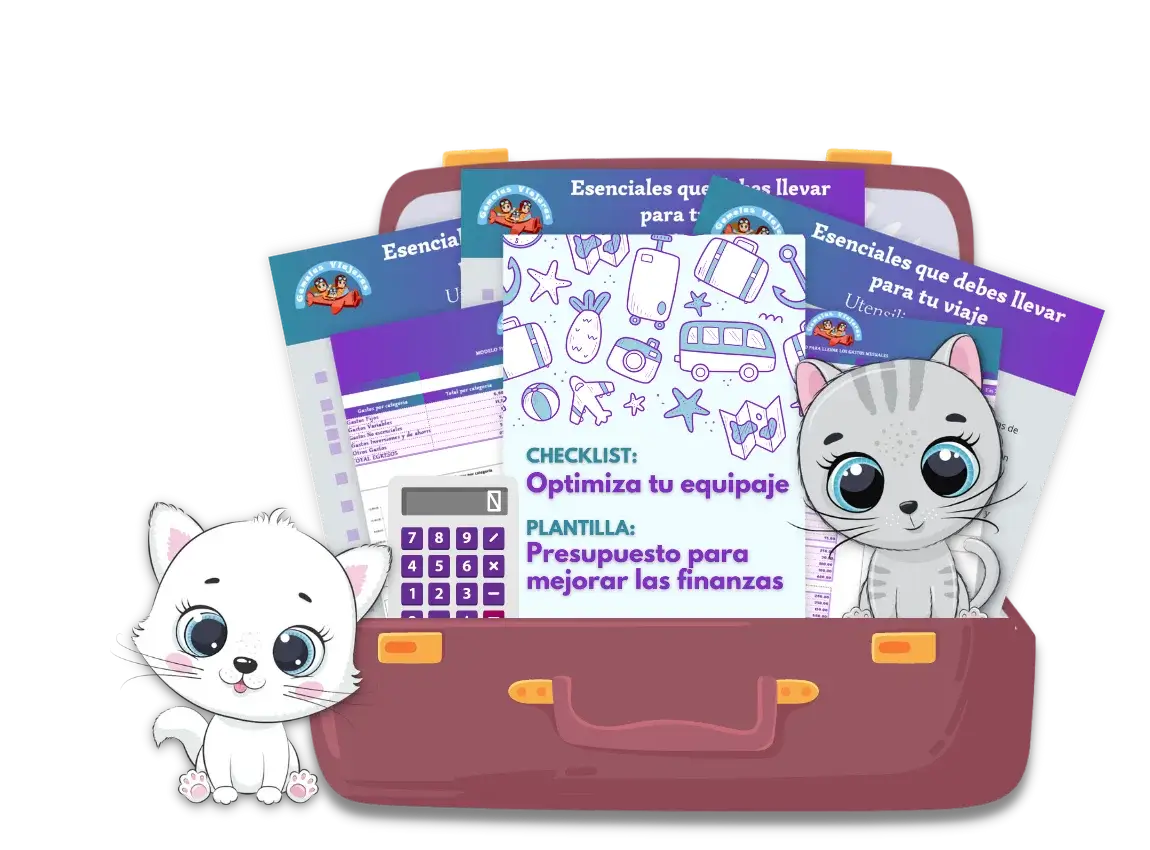Theatre
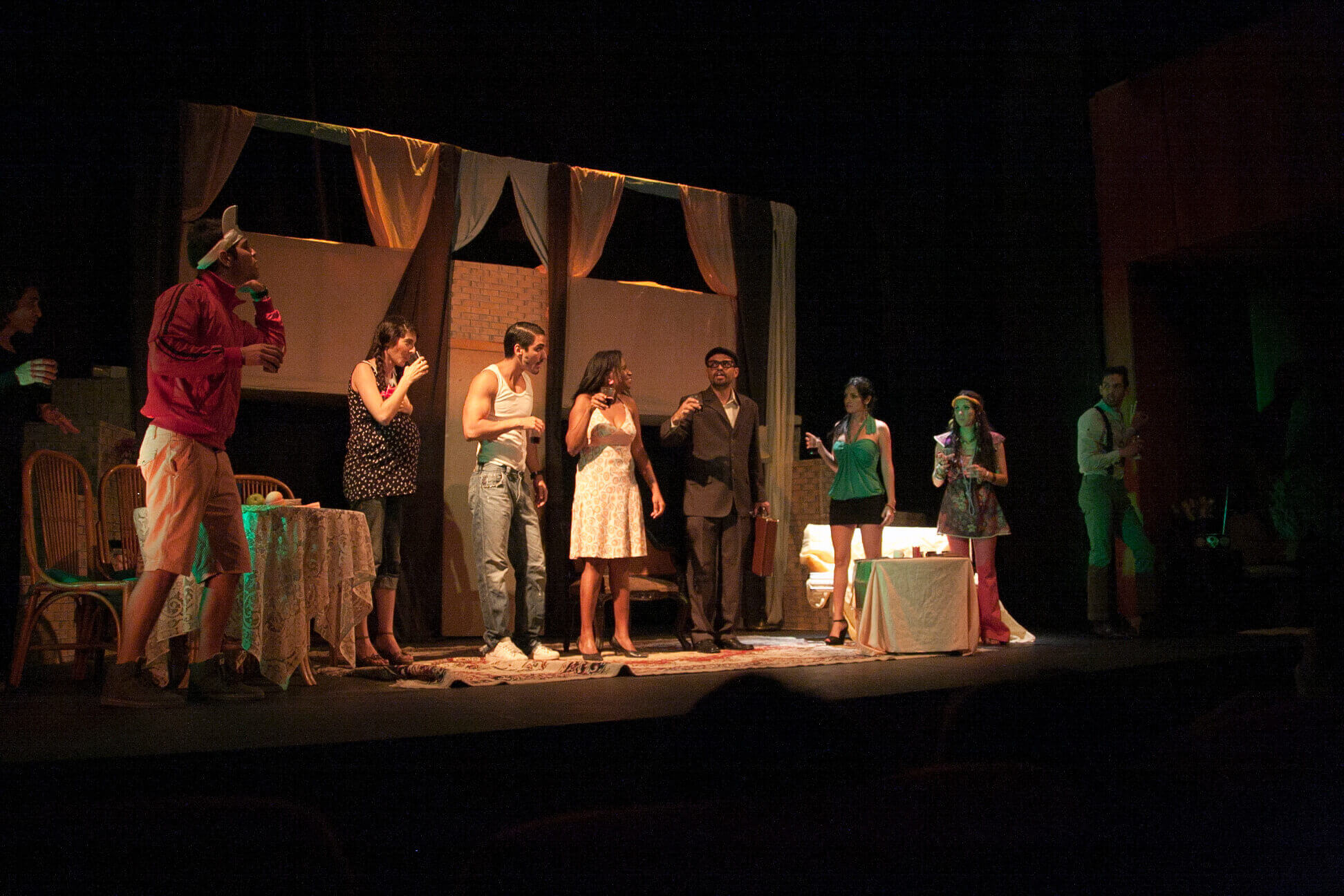
As a good and ascendant Aquarian I wanted to browse and go further so I got myself, encouraged by the success of the advertisement, into a permanent acting workshop.
There I learned not only at the acting level but in the Person, the character. I met some of the best teachers: Nelson Ortega.
What I enjoyed most in the time I was doing theater was the reactions of the audience during the performance, the teamwork and the backstage anecdotes with my acting partners. The laughs, the jokes, the nerves before leaving the scene peeking through a hole in the curtain to know who is in the room, etc.
It was one of the best stages of my life and one that I have enjoyed doing the most. I have learned to work as a team which is important because it shows in the final work.
In each performance there was always something different to tell -and that is the interesting thing about the theater- that as there is no cut or opportunity to do it again (I mean, if you make a mistake with a text you were wrong and so it was). So that’s what came out and you’re good to go. Sometimes you had to improvise and that made it super fascinating.
The gain wasn’t much, but the satisfaction of seeing the audience enjoy it was immense and rewarding.
Doing theater in Venezuela is not easy, however I am very grateful for the opportunity to performe in different theaters. And best of all, to be part of a theater group that the teacher told us he was very proud of us. That filled me with even more joy, and we were given many opportunities to do performances.
Forming the company “Grupo Teatral Veedu”, was also not an easy job. However, with teamwork the load is lightened quite a bit and as the team members were so excited about the project, we all fully enjoyed the road, which became more enjoyable and fun.
We did more than 300 performances and toured the theaters such as the CELARG, the Parque Central Theater, The Central Bank of Venezuela, La Vega Theater, San Agustin Theater. We participate in the Caracas Theater Festival, among others.
Party in the Llano and others
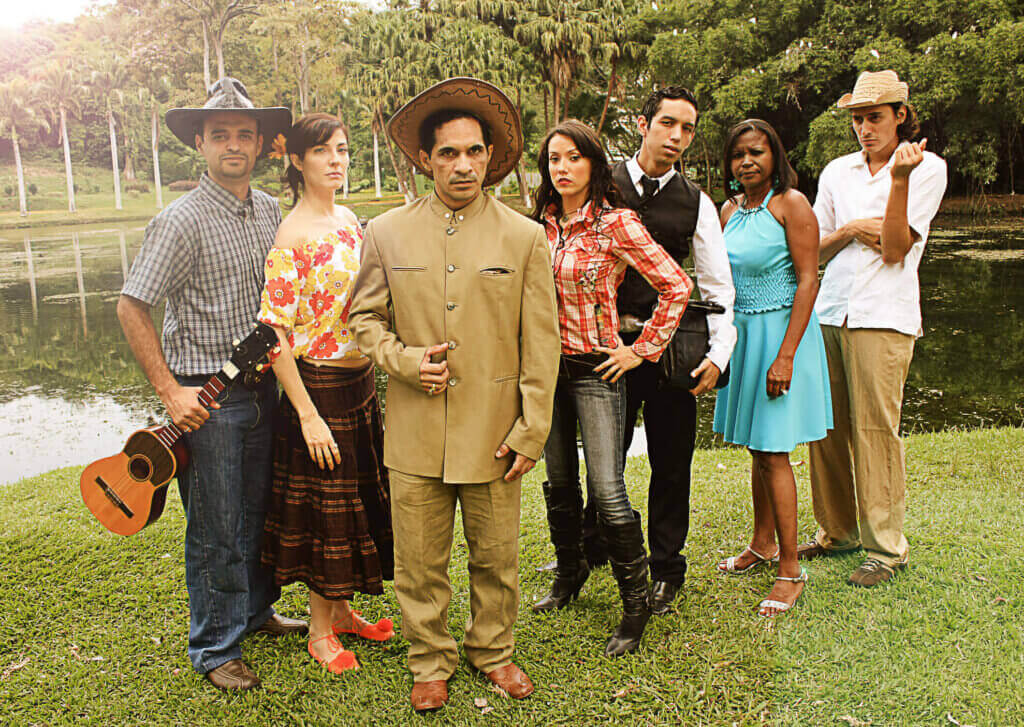
Within my experience in the theater, the most unforgettable experience and full of funny stories and applause was undoubtedly the assembly and performing of the play “Fiesta en el Llano“.
With this work we toured many rooms. This work was written by my close friend and fellow at the time Norkis Cañizales. And my character in the play was named Omaira Graterol.
A totally comedy play and that people felt identified with the plot because it happens in Venezuelan families and in Latin America and care if not in the whole planet earth.
More than one will have had their family fighting for money.
Another of the characters I enjoyed playing was Haile, a girl with Tourette’s Syndrome, from the play “No hay cama pa ́ tanta gente“, also written by Norkis Cañizales.
I really feel really lucky to be able to participate in plays where deep down there is an important message that brings and adds to society. I remember when I received the text of the new character, at first I wasn’t quite happy because I didn’t have enough speech but then when I built the character I realized that there is no small role but small character.
So I added a nervous tic to the character and that’s when the character got big!
Then I appreciated that little character so much, because thanks to that I managed to transform something small into something cool and fun for the audience.
You definitely learn so much from the characters that it’s like living several different lives in one and that’s another magic of theater.
Then I had the opportunity to participate in the play “Catherine the Rebel” by William Shakespeare. Also drama-comedy in which I played Teresa the mother of the star of the play.
In Chile
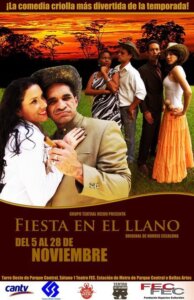 A couple of years ago I was invited by my old theater company to performe “Fiesta en el Llano” in the Chilean capital.
A couple of years ago I was invited by my old theater company to performe “Fiesta en el Llano” in the Chilean capital.
At that time I was already living in Canada and I was happy to reconnect with my passion for theatre and see my fellow stage mates again.
At first, although excited, I was a little worried about how the reception of the play was going to be by the Chilean public, because it was written in a very colloquial language of the Venezuelan plain and I was worried that the audience in Santiago might not understand some jokes, puns and so on.
Or even, possibly not getting to understand the work.
However, to my surprise, the response from the Chilean public was very positive. They even congratulated us and approached us, after the play to talk to us.
That was a confirmation that the language of theatre is universal.
Theatrical anecdotes
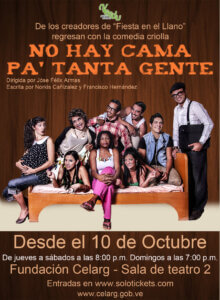 For “Fiesta en el Llano” I had to learn to dance the joropo (Venezuelan folk dance). How excited people were when we started dancing! Music was the unique language to convey emotions and pride for our beautiful Venezuela.
For “Fiesta en el Llano” I had to learn to dance the joropo (Venezuelan folk dance). How excited people were when we started dancing! Music was the unique language to convey emotions and pride for our beautiful Venezuela.
Anecdote: I remember forgetting several of the couplets and I couldn’t think of anything. So I spoke in another language that looked like the language of the indians and since nothing was understood, everyone thought they were part of the script.
Great physical efforts had to be made. In one of the scenes, the blows given by my close friend were real.
In one scene (with my character Omaira Graterol in “Fiesta en el Llano“) the visual communication we had between all of us on stage especially with my friend and fellow actor Jean Mujica was so intense that we could get away with any setback.
I had a strong argument with Don Isaias (the owner of the farm) and it turns out that behind me there was a candle (I didn’t realize it) I was backing and back and the people in the audience were saying “It’s going to burn, it’s going to burn!” I kept backing down until one of my fellow actors, Luis who played the owner of the Hacienda, came up with the thought of saying to me, “YOU’RE GOING TO BURN FOR BITCH.” Something out of script and at that moment the whole theater cried out loud.
In another scene, when the wig fell off to “the black one” (one of the actresses who works with us) and the wig was flying all over the stage, it was first grabbed by my partner Norkis. She put it on. Then she threw it to Oakland, another fellow actor, and then she threw it at me. I put it on and with it I stayed the rest of the scene.
This disguised very well the loss of my partner’s wig. And I enjoyed the reaction of the other actors who came on stage and saw me wearing the wig that I shouldn’t wear and couldn’t stand the laughter.
Another anecdote was that in Haile Wacho’s character (“There’s No Bed for So Many People“) she suffered from Turette’s Syndrome and the nervous tics she had, apart from making sounds with her mouth, she also threw punches in one of the scenes she shared with Jean Mujica. She would slap and slap him in the face.
The result? the audience dead of laughter and the poor Jean full of bruises on the face of so many slaps for all the times that the scene had to be repeated.
Conclusions
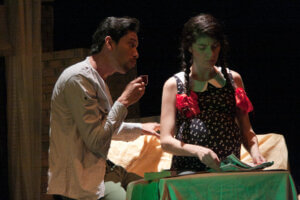 Remembering all my stage of theater and talent of advertisement in Venezuela, has filled us with a lot of joy, because it is one of the most endearing periods of our life, in addition to allowing us to reconnect with our roots and old friendships.
Remembering all my stage of theater and talent of advertisement in Venezuela, has filled us with a lot of joy, because it is one of the most endearing periods of our life, in addition to allowing us to reconnect with our roots and old friendships.
Life is made of experiences and if these experiences are happier than sad, we can say that one has a happy life.
I think that’s the case for us. We consider ourselves fortunate to have lived the experiences and to have had the friendships we had while doing acting on television and theater.
And only now can we understand what great influence that stage lived in Venezuela has had on our character.
